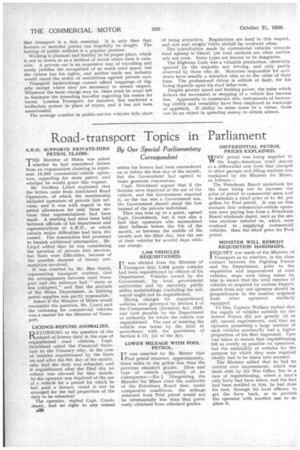Road-transport Topics in Parliament
Page 30

If you've noticed an error in this article please click here to report it so we can fix it.
By Our Special Parliamentary Correspondent
A.R.O. SUPPORTS PRIVATE-HIRE PETROL CLAIMS.
THE Minister of Mines was asked whether he had considered letters from an organization claiming to represent 16,000 commercial-vehicle operators, appealing for more petrol, and whether he would grant this request.
Mr. Geoffrey Lloyd explained that the letters came from Associated Road Operators, of which the membership included operators of private hire services, and it was with regard to the petrol allowances for only those services that representations had been made. A meeting had since been held between officials of his department and representatives of A.R.O., at which certain major difficulties had been discussed. The Association had promised to furnish additional information. Mr. Lloyd added that he was considering the question of private hire services, but there were difficulties, because of the possible element of luxury consumption involved.
It was asserted by Mr. Ben Smith, representing transport workers, that the arrangements between road transport and the railways had "more or less collapsed," and that the attitude of the Mines Department, in limiting petrol supplies was partly responsible.
Asked if the Minister of Mines would reconsider the question, Mr. Lloyd said the rationing for commercial vehicles was a matter for the Minister of Transport.
LICENCE-REFUND ANOMALIES.
RETURNING to the question of the refund of licence duty in the case of requisitioned road vehicles, Capt. Strickland asked the Financial Secretary to the Treasury why, in the case of vehicles requisitioned by the State on and after the 8th day of the month. only half the duty was refunded, and if requisitioned after the 22nd day no refund was allowed for that month. As the operator was deprived of the use of a vehicle for a period for which he had paid a licence, could it not be arranged for the full proportion of the duty to be refunded?
The operator, replied Capt. Crookshank, had no right to any refund 6.28 unless his licence had been surrendered on or before the first day of the month, but the Government had agreed to make generous concessions, Capt. Strickland argued that if the licensee were deprived of the use of the vehicle, and the Government required it, as the tax was a Government tax, the Government should stand the loss instead of the private individual.
That was true up to a point, agreed Capt. Croolcshank, but it was also a fact that operators who surrendered their lic6nces before the 7th of the month, or between the middle of the month and the 22nd day, had the use of their vehicles for several days without charge.
2,508 VEHICLES REQUISITIONED,
IT was elicited from the Minister of I Transport that 2,508 goods vehicles had been requisitioned by officers of his Department. Vehicles owned by the Government, by local government authorities and by statutory public utility undertakings (including the railways) a might not be requisitioned.
Hiring charges for requisitioned vehicles were governed by Section 4 of the Compensation (Defence) Act, 1939, and were payable by the Department or authority for whom the vehicle was requisitioned. The cost of insuring the vehicle was borne by the hirer in accordance with the provisions of Section 4 (1) (a) of the Act, LOWER MILEAGE WITH POOL PETROL.
IT was asserted by Mr. Remer that Pool petrolreturned, approximately, three miles to the gallon less than the previous standard grades. [Size and type of vehicle apparently of no consequence.—En.] Disagreeing, the Minister for Mines cited the authority of the Petroleum Board that, under comparable conditions, the mileage obtained from Pool petrol would not be substantially less than that previously obtained from sandard grades.
DIFFERENTIAL PETROL PRICES EXPLAINED.
WHY petrol was being supplied to the Anglo-American retail depots at a differential rate from that charged to other garages and filling stations was explained by the Minister for Mines, as follows:—
The Petroleum Board undertook for the time being not to increase the price of petrol to commercial users and to maintain a retail price of is. 6d. per gallon for Pool petrol. It was on this account that commercial-vehicle operators were paying less from a Petroleum Board wholesale depot, such as the service stations referred to, which were confined to supplying commercial vehicles, than the retail price for Pool petrol.
MINISTER WILL REMEDY REQUISITION HARDSHIPS.
I NQUIRY was made of the Minister of Transport as to whether, in the close contact between the Fighting Forces• and his Department, prior to the requisition and impressment of road vehicles, steps were being taken by him to secure that the total number of vehicles so acquired by various Departments from any one operator should be proportionate to the number acquired from other operators similarly equipped.
To this, Captain Wallace replied that the supply of vehicles suitable for the Armed Forces did not greatly (if at all) exceed requirements, and that an operator possessing a large number of such vehicles necessarily had a higher proportion of his fleet impressed. Care was taken to ensure that requisitioning fell as evenly as possible on operators, but the suitability of vehicles for the purpose for which they were required clearly had to be taken into account.
The Minister added that he had no control over impressment, which was dealt with by the War Office, But in a case of requisitioning, where a man's only lorry had been taken, and the fact had been notified to him, he had done his best, through his local officers, to get the lorry back, or to provide the operator with another one to replace it.




















































